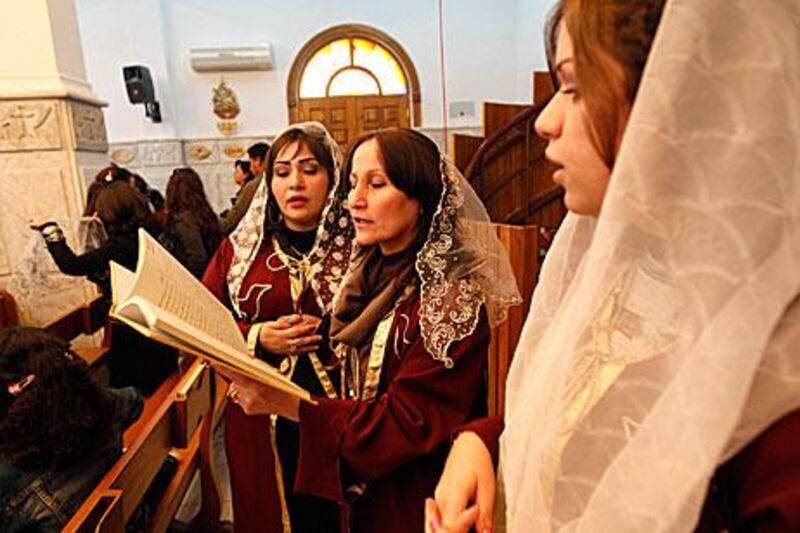BAGHDAD // Iraq's dwindling Christian population marked Christmas yesterday with religious leaders calling for peace, days after attacks across Baghdad killed dozens and a political row raised sectarian tensions.
The commemoration came a week after US forces completed their withdrawal from the country, with a senior bishop noting little was being done to prevent a continuing Christian emigration from Iraq.
At the Church of Our Lady of Sacred Heart in east Baghdad, hundreds of worshippers gathered for a 90-minute morning mass yesterday, the second of three such celebrations planned by the church.
Outside, half a dozen armoured security vehicles and an Iraqi army Humvee stood guard, with several heavily-armed soldiers and policemen patrolling the street opposite the church. A handful of soldiers with machine guns were also perched atop the building.
"Our faithful are like everyone in Iraq - they have fear," said Bishop Shlemon Warduni, the second most senior Chaldean in Iraq. "They feel there is no peace, no security, so they go where they can live in peace. We don't agree, we don't want them [to go], but they say, 'If we don't go, can you ensure my life, can you ensure my job, can you ensure the future?'.
"We cannot ensure our lives, how can we ensure their lives? The government cannot ensure their lives, how can we ensure their lives? This is our dilemma. Emigration is a very bad sickness, and it is contagious."
Bishop Warduni said he wanted his congregation to "pray for all of Iraq to become more quiet, more peaceful, to have more togetherness and dialogue with one another - Shiite, Sunni and Christian."
The bishop cancelled a midnight mass over security concerns following attacks on Thursday across Baghdad that left 60 people dead, the worst to strike Iraq in more than four months.
Unlike in previous years, the Shiite mosque across the street did not blast Quranic recitations over loudspeakers during the mass.
"We came in fear but this is a duty, we have to do it," said Nibras Naama, 30, a pharmacist among Bishop Warduni's congregation. "We don't want churches to be empty because of fear."
Ms Naama did not wish to leave Iraq "but the continuous violence and bad security may force us to".
Churches in Kirkuk, where a significant chunk of Iraq's Christian population remain, also cancelled midnight mass.
Louis Sako, Chaldean archbishop for Kirkuk, said he was "worried about the security situation".
Bishop Warduni estimated that Iraq's Christian population, put at between 800,000 to 1.2 million before the 2003 US-led invasion that overthrew dictator Saddam Hussein, had halved since then.
Their plight was highlighted by an October 2010 assault on a Baghdad church by Al Qaeda that killed 44 worshippers, two priests and seven security force members. Bishop Warduni's church was hit by a car bomb on July 12, 2009, that killed four and wounded 21.
According to Sako, 57 churches and houses of worship in Iraq have been attacked since the invasion, with more than 900 Christians killed and more than 6,000 wounded.
US troops completed their withdrawal last week, leaving security in the hands of an Iraqi force more than 900,000-strong.
Officials say it can maintain internal security, although they acknowledge it lacks the means to defend Iraq's borders, airspace and territorial waters. The claim was dealt a blow by Thursday's violence.
The attacks raised sectarian tensions amid a worsening political dispute that has seen Iraq's Shiite prime minister seek to sack his Sunni Arab deputy, and authorities issue an arrest warrant for the Sunni vice president on charges he ran a death squad, accusations he denies.





